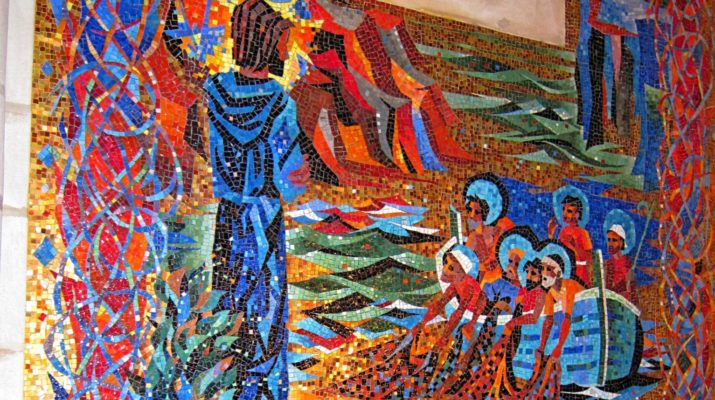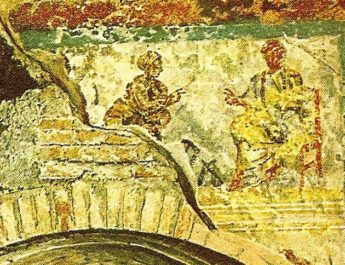BibleHub
3 For I handed onA to you as of first importanceB what I in turn had received:C
Notes on verse 3a
A “handed on” = paradidomi. From para (from beside, by) + didomi (give, offer, place, bestow, deliver; give in a literal or figurative sense). This is literally to hand over – hence to deliver, abandon, or betray. It implies a personal involvement.
B “first importance” = protos. From pro (before, first, in front of, earlier). This is what is first, which could be the most important, the first in order, the main one, the chief.
C “received” = paralambano. From para (beside, by, in the presence of) + lambano (active acceptance/taking of what is available or what has been offered; emphasizes the choice and action of the individual). This is to receive, take, acknowledge, associate with. It can also mean to take on an office or to learn.
that ChristD diedE for our sinsF in accordance with the scriptures,G
Notes on verse 3b
D “Christ” = Christos. From chrio (consecrate by anointing with oil; often done for prophets, priests, or kings). Literally, the anointed one, Christ. The Greek word for Messiah.
E “died” = apothnesko. From apo (from, away from) + thnesko (to die, be dead). This is to die off. It is death with an emphasis on the way that death separates. It can also mean to wither or decay.
F “sins” = hamartia. From hamartano (to miss the mark, do wrong, make a mistake, sin); {from a (not) + meros (a part or share)}. Literally, this means not having one’s share or portion – like not receiving inheritance or what was allotted to you. This word means missing the mark so it is used for guilt, fault, and acts of sin.
G “scriptures” = graphe. From grapho (to write). This is literally writing, a document. In the New Testament, this is always used for scripture.
4 and that he was buried,H and that he was raisedI on the thirdJ dayK in accordance with the scriptures, 5 and that he appearedL to Cephas,M then to the twelve.N
Notes on verses 4-5
H “buried” = thapto. 11x in NT. This is to bury or hold a funeral.
I “raised” = egeiro. This is to awake, raise up or lift up. It can be to get up from sitting or lying down, to get up from sleeping, to rise from a disease or from death. Figuratively, it can be rising from inactivity or from ruins.
J “third” = tritos. From treis (three). This is third.
K “day” = hemera. Perhaps from hemai (to sit). This is day, time, or daybreak.
L “appeared” = horao. To see, perceive, attend to, look upon, experience. Properly, to stare at and so implying clear discernment. This, by extension, would indicate attending to what was seen and learned. This is to see, often with a metaphorical sense. Can include inward spiritual seeing.
M “Cephas” = Kephas. 9x in NT. From Aramaic kepha (stone or rock). This is Cephas, the Aramaic translation of Peter’s name.
N “twelve” = dodeka. From duo (two, both) + deka (ten). This is twelve – also shorthand for the apostles.
6 Then he appeared to more than five hundredO brothersP and sisters at one time,Q
Notes on verse 6a
O “five hundred” = pentakoisioi. 2x in NT. From pente (five) + hekaton (a hundred). This is five hundred.
P “brothers” = adelphos. From a (with, community, fellowship) + delphus (womb). This is a brother in a literal or figurative sense. It is also used of another member of the Church.
Q “at one time” = ephapax. 5x in NT. From epi (on, upon, what is fitting) + hapax (once, once for all); {from a (with – signifying fellowship) + pag-} or {from hapas (all; every part working together as a unit); from hama (at once, together with) + pas (all, every, every kind of) or from a (with) + pas (all, every)}. This is once for all, at once, one time.
mostR of whom are still alive,S though some have died.T
Notes on verse 6b
R “most” = pleion. From polus (much, many, abundant). This is many, more, great, having a greater value, more excellent.
S “are still alive” = meno. This is to stay, remain, wait, await, continue, abide, endure. It can mean to literally stay in a place or to remain in a condition or to continue with hope and expectation.
T “died” = koimao. 18x in NT. From keimai (to lie, recline, set, be appointed, be destined). This is to sleep or put to sleep. Figuratively, it can mean to die. In the New Testament, it is used 15x for death and 3x for sleep.
7 Then he appeared to James,U then to allV the apostles.W
Notes on verse 7
U “James” = Iakobos. From Hebrew Yaaqov (Jacob); from the same as aqeb (heel, hind part, hoof, rear guard of an army, one who lies in wait, usurper). This is James, meaning heel grabber or usurper.
V “all” = pas. Related to “at one time” in v6. See note Q above.
W “apostles” = apostolos. From apostello (to send, send away, send forth as a messenger, to commission); {from apo (from, away from) + stello (to set, arrange, prepare, provide for); {probably from histemi (to stand, place, set up, establish, stand firm)}}. This is a messenger – someone sent out on a mission as an envoy or delegate. It can also refer to someone set at liberty. Generally, this is a messenger who is meant to be a representative of the one who sent them. They are thus, set apart on a mission literally or figuratively.
Image credit: “IMG_2615-1” by Matt Drobnik, 2012. It depicts the fifth mosaic in the Resurrection Chapel of the Washington National Cathedral, designed by Rowan and Irene LeCompte.




